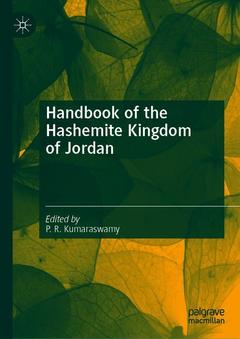The Palgrave Handbook of the Hashemite Kingdom of Jordan, 1st ed. 2019
Coordonnateur : Kumaraswamy P. R.

This Handbook presents a broad yet nuanced portrait of the Hashemite Kingdom of Jordan, its socio-political rifts, economic challenges, foreign policy priorities and historical complexities.
The Hashemite Kingdom of Jordan has traditionally been an oasis of peace and stability in the ever-turbulent Middle East. The political ambitions of regional powers, often expressed in the form of territorial aggrandisement, have followed the Hashemites like an inseparable shadow. The scarcity of natural resources, especially water, has been compounded by the periodic influx of refugees from its neighbours.
As a result, many?Arab and non-Arab alike?have questioned the longevity and survival of Jordan. These uncertainties were compounded when the founding ruler, King Abdullah I, became involved in the nascent Palestinian problem at the end of World War II. The annexation of the eastern part of Mandate Palestine or the West Bank in the wake of the 1948 War transformed the Jordanian demography and sowed the seeds of an uneasy relationship with the Palestinian component of its population, citizens, residents and refugees.
Though better natural resources and stronger leaders have not ensured political stability in many Arab and non-Arab countries, Jordan has been an exception. Indeed, since its formation as an Emirate by the British in 1921, the Kingdom has seen only four rulers, a testimony to the sagacity and political foresight of the Hashemites.
The Hashemites have managed to sustain the semi-rentier model primarily through international aid and assistance, which in turn inhibits Jordan from pursuing rapid political and economic reforms. Though a liberal, multi-religious and multicultural society, Jordan has been hampered by social cleavages especially between the tribal population and the forces of modernization.P. R. Kumaraswamy is a Professor of Contemporary Middle East Studies at Jawaharlal Nehru University (JNU), New Delhi, India. From 1992-1999 he was a research fellow at the Harry S. Truman Research Institute for the Advancement of Peace, Jerusalem. Since joining the JNU in September 1999, he has been researching, teaching, and writing on various aspects of the contemporary Middle East. His works include Squaring the Circle: Mahatma Gandhi and the Jewish National Home (2018); India’s Israel Policy (2010); and Historical Dictionary of the Arab Israeli Conflict (2015, second edition). Prof Kumaraswamy has edited a number of books and published research articles in international journals. In October 2009 he set up the virtual Middle East Institute, New Delhi and serves as its honorary director. He is also the editor of Contemporary Review of the Middle East and the series editor of Persian Gulf: India’s Relations with the Region.
Contributors
Faisal Odeh Al-Rfouh is a professor of international relations in the University of Jordan, Amman.
Alexander Bligh is the Chief Scientist, Ministry of Science, Technology and space, Israel.
Chen Bram is a research fellow at the Truman Institute of the Hebrew University, and a senior lecturer at the department for behavioral science at Hadassah Academic College, Jerusalem.
Françoise De Bel-Air is a Research Fellow and Scientific Coordinator for Demography within the Gulf Labour Markets, Migration and Population Program (GLMM) coordinated by the Gulf Research Centre in Geneva and the Migration Policy Centre of the European University Institute in Florence, Italy.
Donna Robinson Divine is the Morningstar Family Professor of Jewish Studies and Professor of Government, Emerita at Smith College.
Imad El-Anis
Handbook adopts a holistic approach towards Jordan and its multicultural mosaic and challenges
Presents contributions from leading scholars on Jordan and Middle East offering nuanced understanding of the Hashemite Kingdom
Covers diverse areas including its polity, society, foreign policy, history and developmental issues
Date de parution : 12-2019
Ouvrage de 536 p.
14.8x21 cm



